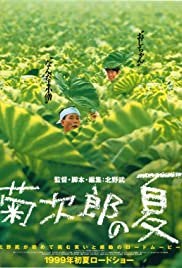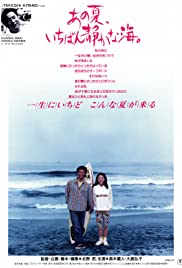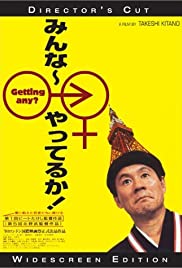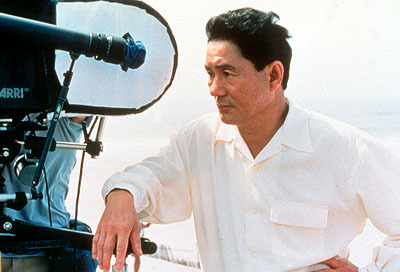Takeshi Kitano began his career in the ‘70s and ‘80s as a comedian under the moniker ‘Beat Takeshi’, first as half of a comedy duo ‘The Two Beats’ and later on his own, becoming one of the biggest comedians in Japan. In fact, many Americans who don’t watch much foreign cinema may be most familiar with him as “Vic Romano” in Most Extreme Elimination Challenge, the English-dubbed version of his game show Takeshi’s Castle. But in the ‘80s, his desire to be taken more seriously grew which led ultimately to his taking over directing duties on his debut Violent Cop when Kinji Fukasaku wasn’t able to direct it. While Violent Cop dealt with some of the themes Kitano would return to over the years, it was his second film Boiling Point that really brought forth the style he would return to throughout his career: long takes with little action, sparse dialogue, deadpan delivery and short but very graphic bursts of violence. Many of the films in his career dealt with yakuza, which was influenced by actual anecdotes he would hear from real gangsters who would hang out with him after his comedy shows in his early career. Kitano struggled with homeland acceptance of his more serious work for a long time though, and it wasn’t until Hana-bi won the Gold Lion award at the Venice film festival that people began to take him more seriously as a filmmaker. He has amassed quite a body of work that for the most part shows a very distinctive and uncompromised vision unconcerned with mainstream popularity and here’s hoping we continue to see more of Kitano’s unique worldview in years to come.

Kikujirô (1999)
Kikujirô, like his earlier films Sonatine and Kids Return, features a yakuza as the main character but isn’t really about gang wars at all. Instead it’s a film about an older, disgruntled gangster who crosses paths with a young boy traveling across the country to find his mother and the adventures they have together on the road. This one, more than many of Kitano’s films, shows that he has a sweet, sentimental side to him while still infusing the events with his quirky deadpan humor. It strikes an almost perfect balance of melancholy and light fun that makes it a very pleasant, memorable watch.

A Scene at the Sea (1991)
a.k.a. Ano natsu, ichiban shizukana umi
A Scene at the Sea might be Kitano’s most quiet film, appropriate given that it’s about a downtrodden and picked on deaf man who comes across a broken surfboard one day on the boardwalk by the ocean while performing his duties as a garbage man and becomes determined to learn how to swim and surf, supported by his girlfriend who is also deaf. This is a very simple film in some ways but has some beautiful moments that elevate what could have been a dull slog and instead make it a calming and languidly lovely experience. Having said that, this is not one I would recommend for casual fans of Kitano as it typifies his style more than most of his films, at times coming across so slight that it seems like nothing is happening at all. But isn’t that when some of the most important things are happening? It’s a film of subtle glances and small gestures that mean the world.

Getting Any? (1994)
a.k.a. Minnâ-yatteruka!
Made after A Scene at the Sea and Sonatine, Getting Any? Feels as if Kitano wanted to show people who were complaining about his films not being funny (although I think Sonatine had some very dark, funny stuff in it…just not the kind of comedy people expected from Kitano) that he could still create a loud, wacky, ridiculous movie that would get people laughing again. You could say a lot of things about this film but that it holds back on the crazy is not one of them. It follows a Walter Mitty-esque plot of a young guy who wants nothing more in life than to buy a car to have sex in which continually sends him off into daydreams where he fantasizes about doing the nasty wherever he goes. He then takes on a series of jobs that put him in increasingly crazy situations eventually culminating in becoming the guinea pig in a series of lab experiments led by two crackpot scientists (Kitano himself playing one of them). Getting Any? has some legitimately hilarious stuff in it with Kitano still using his deadpan style of humor to play off the absurdity of the situations the main character finds himself in. Still at times this gets too wacky and crazy for its own good, especially in the final act. I can definitely see why this wasn’t too warmly received by the international crowd, coming between Sonatine and Kids Return. It would be like Paul Thomas Anderson delivering a movie like Dude Where’s My Car in between The Master and The Phantom Thread. Regardless, if you are in the right headspace for it, this one can get a lot of laughs.

Outrage (2010)
a.k.a. Autoreiji
Outrage finds Kitano returning once again to a yakuza story, but this time, it flows like a more traditional gangster story with a veritable cavalcade of dialogue compared to Kitano’s usual film work and a much more propulsive narrative. While it does have some of his trademark long takes and sparse, static camerawork, the violence feels more front-and-center rather than as a punchline to an incredibly grim joke. The movie is also throwing betrayals and double crosses at you constantly, keeping you always off-balance and suspicious of who is really aligned with who. This may actually be an ideal film to ease people into Kitano’s work if they haven’t seen many non-mainstream films as it is possibly the most “normal” film I’ve seen from Kitano while still also including elements of his style.

